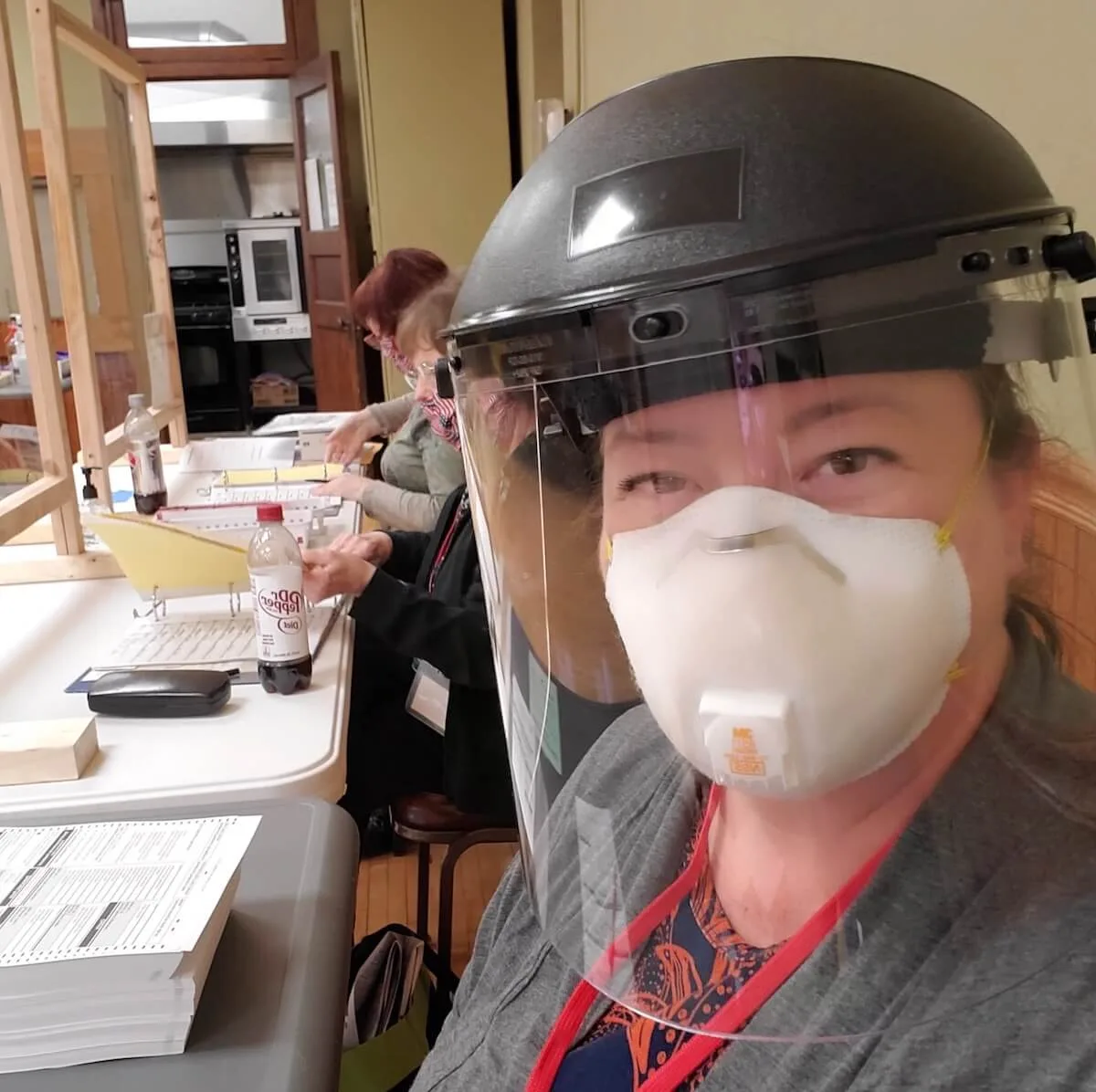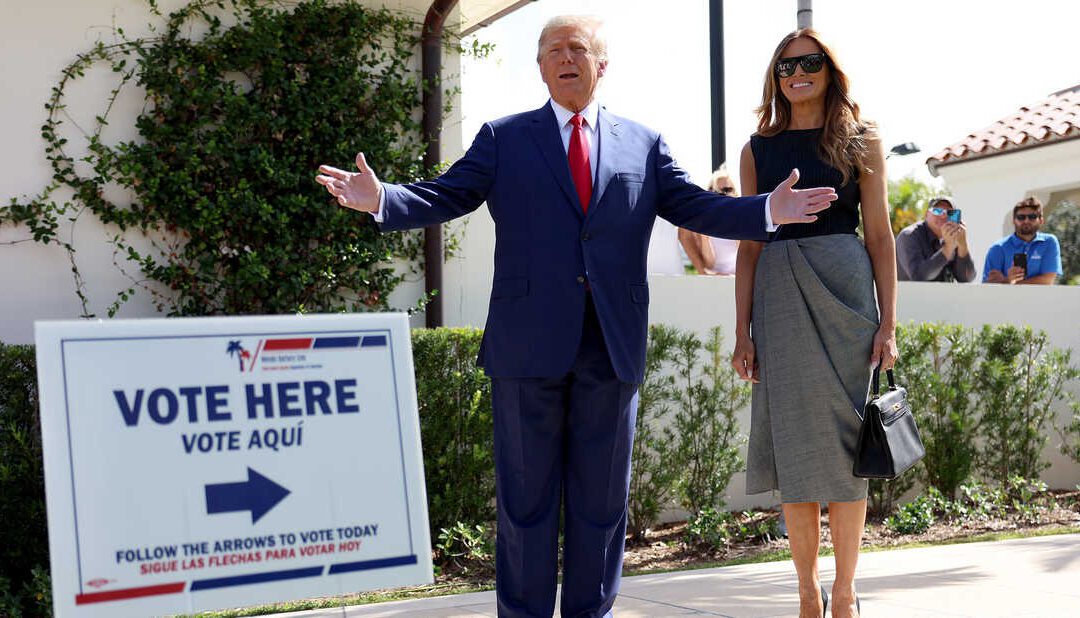
#image_title
The workers who staff polling places despite COVID-19 concerns.
Alyssa Van Duyse worked as election worker for the first time in April when the coronavirus pandemic had recently surfaced, filling in for people who traditionally staffed polling places but bowed out because of health concerns related to COVID-19.
On Nov. 3, Van Duyse, who works as a marketing specialist at HSHS St. Joseph’s Hospital in Chippewa Falls, will assist voters at a polling place in that city again. This time she will do so amid a surge of COVID-19 cases making Wisconsin a hotspot nationally for the contagious virus that has killed more than 1,500 in this state and more than 215,000 across the nation.
“Last spring I did it because I wanted to help people who were vulnerable to the virus,” Van Duyse said, noting many election workers typically are elderly and at higher risk of being impacted by the coronavirus. “That is part of my reasoning this time too, and I see my colleagues in the hospital working their butts off and doing what’s right for our community. I really want to be able to help out in my own way too.”
As occurred in the April election, the ongoing pandemic is prompting some poll workers—many of whom are elderly—to stay home rather than work at polls because they’re concerned they could contract the virus. Wisconsin Elections Commission Administrator Meagan Wolfe said elections officials across Wisconsin should recruit additional polling place workers and plan on possible no-shows because of COVID-19.
The number of voters showing up at polling places is likely to be less than in a normal presidential election, given that a record number of voters are expected to cast their votes by absentee ballot. But election turnout is still projected to be high because of interest in the presidential race between Republican President Donald Trump and his Democratic challenger Joe Biden.
Van Duyse said she is motivated to work at her election site again to ensure the people’s right to vote. That right is paramount to a democracy, she said, and working as a poll worker is her way to help the election take place.
“This is something I can do to make sure people have the opportunity to vote,” Van Duyse said.
Eau Claire resident Jason Endres feels similarly. Despite having a lung condition related to his spina bifida that makes him susceptible to COVID-19, Endres said he plans to be a poll worker on Nov. 3. He has done that job since 2018 but did not work at a polling place in April because of concerns about the virus.
“I do worry a little bit,” he said. “However, the risk is worth the reward, which is to give a voice to that voter to cast their ballot in this highly contested election season.”
With COVID-19 cases spiking in Dane County, Emilee Rabbitt said now “is a scary time to be working with the public.” But she plans to work at the polls on Nov. 3, her second time doing so, because she feels committed to ensuring people can vote.
“Elections are foundational to our democracy, and beyond the presidential race, there are many local elections that have an effect on our daily lives,” she said.
Election officials say Wisconsin polling places will be as safe as possible, with workers wearing masks, social distancing markers and plexiglass barriers keeping people spaced apart, and ample supplies of hand sanitizer.
Eau Claire resident Sandra McKinney, a retired minister, said she refrained from working during the spring election because of the coronavirus but decided to do so for the August primary and plans to do so next month after seeing safety precautions at election sites. Others said the high number of people voting via absentee ballot this election should reduce the number of in-person voters, reducing chances of COVID-19 spread at polling places.
Even with far more cases of the virus in Wisconsin currently than during the spring election, Van Duyse said she feels safer at her polling place now because of added precautions to prevent its spread and because of great public concern overall about COVID-19. Still, she acknowledges her possible exposure to the virus is dependent in part on the behavior of others. Some have “pandemic fatigue,” she said, and don’t strictly comply with guidelines to prevent its spread.
“I want people to come out and vote, but I also want people to take proper precautions,” she said. “I want to make sure people protect themselves and are keeping others safe while they vote.”
Despite added safety measures, some who have worked at polling places in the past won’t do it this election because of virus-related worries. Janet Bethke-Ede staffed elections in the Buffalo County city of Mondovi for years but decided against it this time around.
“I decided it was time to quit,” she said. “I don’t want to take any risks at my age and with underlying health issues.”
Patti Shafer, a chief inspector at an Eau Claire voting site, said she will work a partial day rather than her normal full day on Nov. 3 because of her concerns about COVID-19.
“Poll workers are required to wear masks, but voters cannot be turned away if they don’t wear a mask,” she said. “This is concerning to me.”
Others acknowledged virus-related worries but said they’re motivated to work at polling places to step in for people who are at higher risk of contracting COVID-19 and don’t feel safe interacting with the public this election.
“Poll workers are usually retirees and this is a high-risk category,” said Leesa Malek, who will work at the Eau Claire County town of Washington polling site. “I am not at high risk for COVID-19, so I feel I need to participate.”

The very real reason Trump is cracking down on imaginary voter fraud
Donald Trump and Republicans are NOT “trying to make it harder for illegals and dead people to vote.” They’re trying to make it harder to vote —...

Opinion: New justice must protect Wisconsinites’ rights
The April 1st Wisconsin Supreme Court Election will determine the future of the state. As the federal government continues its all-out assault on...

The field is set for an April election to control the Wisconsin Supreme Court
Republican former Attorney General Brad Schimel will face Dane County Judge Susan Crawford in what might be conservatives’ last chance to control...

Badgers vote at nearly double the rate of other college students
We all know Wisconsin is a force on the field, but it turns out Badgers have a stellar track record at the ballot box, too! Earlier this fall, the...




